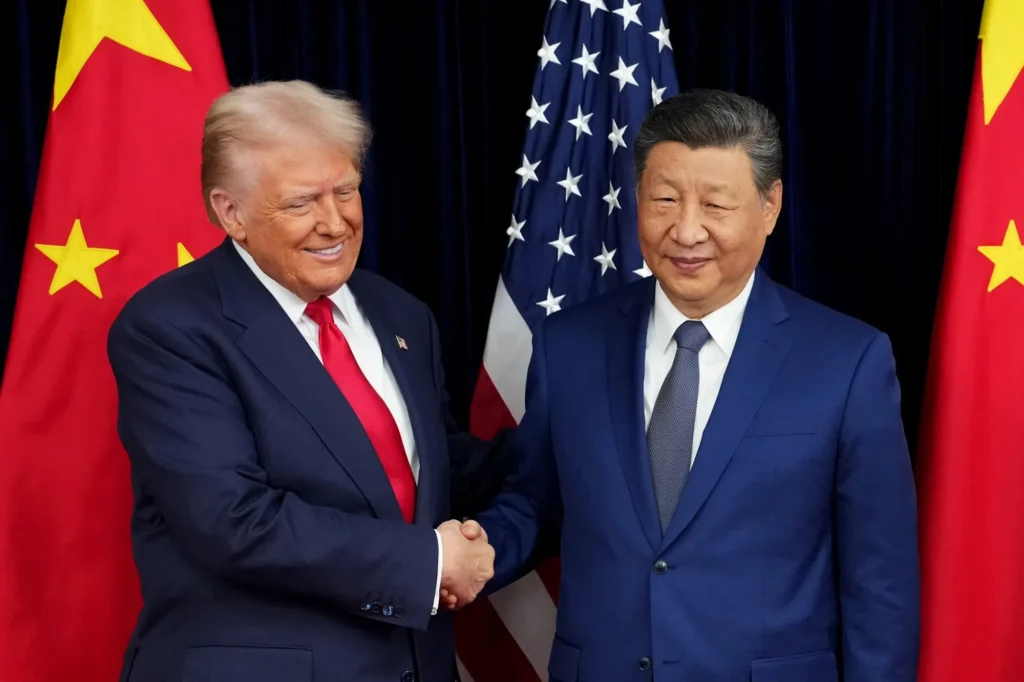The Trump–Xi Seoul Summit on October 30, 2025, represents a watershed moment in US-China relations, marking the first face-to-face meeting between the two leaders since 2019. Held at a military base near Busan during the Asia-Pacific Economic Cooperation summit, this 100-minute engagement resulted in a groundbreaking one-year trade framework addressing critical global issues. Donald Trump emerged euphoric, describing discussions as “amazing” and rating the meeting “a 12 out of 10.”
His remarks proved prophetic, as both leaders committed to substantial economic agreements addressing tariffs, rare earths, and agricultural trade. Xi Jinping acknowledged that both nations should serve as “partners and friends” capable of jointly shouldering responsibility as major powers. The positive tone at the Trump–Xi summit in Seoul contrasts sharply with the preceding months of escalating trade tensions, threatening tariffs, and supply chain disruptions that had roiled global markets.
The Trump–Xi Seoul Summit: Major Achievements and Strategic Wins
The centerpiece involves a significant 10 percentage point tariff reduction on Chinese goods, declining from 57% to 47%. Trump reduced fentanyl-related tariffs from 20% to 10%, contingent upon China’s commitment to combat fentanyl precursor chemical flows devastating American communities. This concession reflects Trump’s prioritization of addressing the opioid crisis, positioning the tariff reduction as a strategic trade-off for enhanced Chinese cooperation on drug trafficking prevention.
The rare earth minerals agreement emerged as the most strategically significant outcome from the Trump–Xi Seoul Summit. China agreed to suspend its recently imposed export controls on rare earths for one year, while the US reciprocated by suspending special port fees for Chinese vessels. Trump emphasized that “all the rare earths have been settled, and that’s for the world,” acknowledging the global significance of supply chain stability. This breakthrough directly addresses critical US supply chain vulnerabilities, as China controls approximately 90% of refined rare earth production, which is essential for semiconductors, defense systems, renewable energy technology, and electric vehicles.
Agricultural trade restoration represents another substantial achievement emerging from negotiations. China committed to resuming large-scale purchases of US soybeans and agricultural products, with purchases beginning “immediately.” This development provides crucial relief to American farmers facing severe market disruptions after China suspended soybean purchases in May 2025, forcing farmers to redirect exports to alternative markets.
Beyond the Trump–Xi Seoul Summit: Strategic Implications and Limitations
Despite optimistic public tones, analysts emphasize that the Trump–Xi Seoul Summit represents a tactical truce rather than a fundamental reset of bilateral relations. Long-standing structural disputes regarding industrial policy, manufacturing overcapacity, intellectual property, and technology transfer remain unaddressed in the agreement. The accord maintains US tariffs near 40% substantially higher than pre-Trump levels, indicating an escalation pause rather than genuine reconciliation.
Notably, the Trump–Xi Seoul Summit deliberately avoided contentious Taiwan and Ukraine discussions, suggesting both leaders prioritized economic stabilization. This compartmentalization allows continued engagement while sidestepping potential dealbreakers that could derail negotiations. Global markets responded positively to outcomes, providing immediate supply chain relief, particularly for US industries dependent on rare earth minerals for manufacturing.
For China, tariff reductions ease mounting pressure from elevated US duties while enabling agricultural export resumption and revenue generation. However, fundamental processing capacity imbalances persist, with the US remaining dependent on Chinese refining infrastructure despite concerted efforts to develop alternative suppliers through Australia and Canada partnerships.
Future Prospects and Great Power Competition
The Trump–Xi Seoul Summit established important frameworks for future high-level engagement, with Trump announcing plans to visit China in April 2026 and Xi expected to reciprocate. This commitment to regular diplomatic contact suggests both leaders recognize sustained dialogue as essential amid broader strategic competition. The one-year agreement includes provisions for routine extension and renegotiation, institutionalizing ongoing negotiations.
Whether this diplomatic breakthrough evolves into sustained cooperation or merely postpones deeper confrontation depends on implementation effectiveness. The Trump–Xi Seoul Summit demonstrates that pragmatic engagement produces mutually beneficial outcomes, offering a blueprint for managing great power relations in an increasingly multipolar world order.
Also Read: Pak-China Shared Prosperity Through Strategic Partnership


